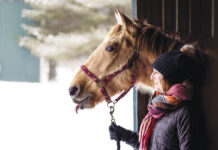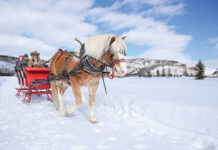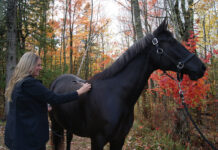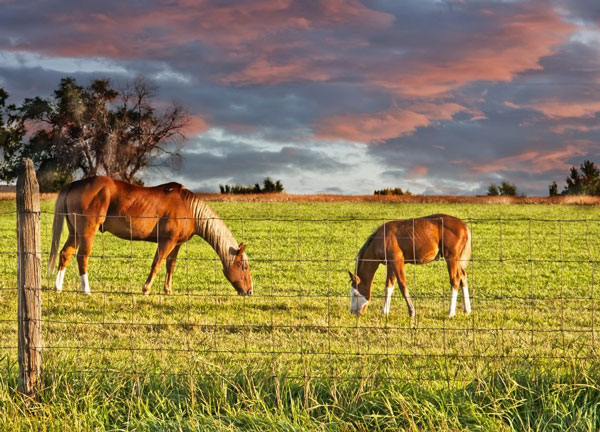
Horses are some of the most majestic animals on this planet—and if you don’t believe us, just take a moment to watch one running in a field. Their movements are so graceful, so powerful, it’s no surprise that these animals have captured the hearts of equestrians for thousands of years. And as a horse owner, you want to give your horses the space, freedom, and comfort that such an amazing animal deserves. However, you also want to keep them safe, which is why it’s important to properly secure any paddock or pasture. But how do you know which fencing is best for your horses?
Types of Horse Fencing
Before you can decide on the type of horse fencing to use, you need to know a little about the types of fencing available to you. Here are some of the most common types of horse fencing you’ll find today.
Woven Wire Fencing
Woven wire fencing, or mesh, is among the most common and preferred horse fence applications today. This is likely because of the many benefits that woven fencing offers: it’s more durable than other options (and therefore more likely to withstand a horse running into it), it’s very affordable, and it’s easy to maintain.
It’s hard to go wrong with woven wire horse fencing. In fact, most veterinarians consider woven wire the safest fencing material for horses. The ‘v-mesh’ style fence weaves wires together in a continuous pattern so there are no loose ends that could cut a horses’ hide. The knotted ‘no climb’ version ‘ties’ the horizontal and vertical wire together with steel knots to provide a tight mesh that won’t slip and prevents horses from climbing up the fence. Both styles flex under pressure, which means horses who like to lean on the fence (or charge it from time to time) can do so without injury or damage to the fence.
Electric Fencing
Let’s say that you have a horse who is a little restless. Maybe he stubbornly tries to break down your fence every day, or maybe he chews on the fence line out of habit. You can change that behavior quickly and easily—all you have to do is install an electric fence.
Electric fences are easy to install and maintain, but more importantly, they are a very effective physical and psychological barrier for your horses. The electric shock they’ll feel from touching the fence isn’t severe enough to cause damage, but it is strong enough to keep your horses at a safe distance from the edge of their pasture.
Pipe Fencing
Steel pipe fencing has been growing in popularity among horse owners in recent years. This type of fencing is durable, long lasting, and can be effective around your paddock or pasture. Additionally, pipe fencing requires little maintenance, which makes it a great choice for busy horse owners who want to make their workload more efficient.
Of course, there is one potential drawback to a pipe fence: the hard steel material could severely injure a charging horse. However, most equestrians with pipe fencing state that, because this type of fence is very easy to see, their horses rarely run into the fence line.
Post and Rail
The wooden post and rail fence is what most people imagine when they think about traditional horse fencing. It’s the kind you see at training or boarding facilities (not to mention every movie that’s ever included a horse-riding scene). Therefore, it shouldn’t be a surprise that many horse owners want to have this type of fencing on their property.
While you may enjoy the idyllic look of post and rail fences, keep in mind that they are expensive to build and require significant upkeep. Repairs and maintenance can add up, both in time and money.
PVC Fencing
Let’s say you want the look of a post and rail fence, but you don’t want to deal with maintaining it. There is an alternative: PVC fencing. Vinyl and PVC fences have the same crisp and clean look of wooden post and rail, but they stand up to the elements better and last much longer.
A PVC horse fence is no small investment, but it can last over a decade with very little maintenance. In many ways, this type of fencing can give you the best of both worlds: a classic, old-fashioned look and a durable fence.
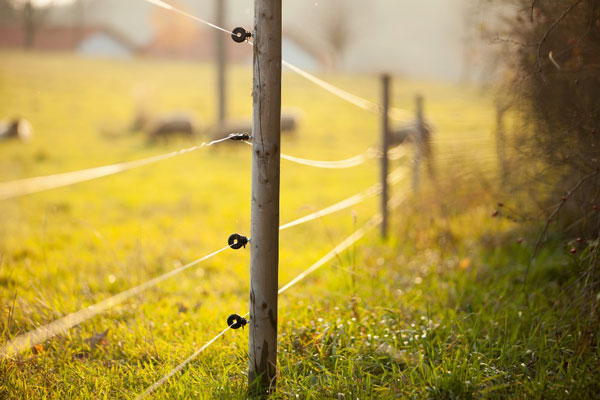
What to Consider When Choosing Your Fence
As we mentioned earlier, the right type of fence for YOUR horses depends on a lot of different factors. When you choose your horse fencing, make sure you consider the following:
Safety
The safety of your horses should be considered first and foremost when choosing your fencing. Your fence should protect your horses from vermin and predators, while also preventing them from escaping their enclosure. You’ll want to look for material that’s flexible enough to snap back if a horse pushes into the fence and that won’t break under pressure, causing injury or escape.
Each type of fence has its pros and cons when it comes to safety. For example:
◆ Woven wire fencing is very flexible, but it can be very difficult for horses to see. Horse owners often add a “sight board” to their wire fence line to help increase visibility.
◆ Electric fencing offers a great psychological barrier and keeps horses securely inside, but it is usually made from electric polywire, which will cut like a knife and badly hurt the horses if it breaks.
◆ Wood and pipe fencing are both very easy for horses to see, but they have almost no give at all, which greatly increases the potential for injury if a horse runs into it.
◆ PVC fencing looks great and requires little maintenance, but it tends to “pop out” of its post if it faces too much pressure (which can be a problem if your horse likes to lean).
Weigh these pros and cons against the behavior you expect from your horses and use that behavior to shape your decision.
Cost
In many cases, installing a new horse fence can mean spending a pretty penny. The cost of the fence itself tends to account for 30% of the overall project cost. You’ll also need to consider posts, braces, fasteners, gates, labor and tools.
Wire fencing tends to be the most affordable option among horse fencing materials today, with pipe and PVC on the higher end of the price range. If you’re on a strict budget and you want to get a lot of “bang for your buck,” wire fencing is the way to go. But of course, if you have a little more room in the budget, you can be free to explore electric, wooden, or other types of fencing.
Installation and Maintenance
Once you determine which type of fencing is best for your horses, you still need to get the fence installed. Do you have the right tools for the job? Do you have the knowledge and experience necessary to install your fence? Electric fencing and wooden fencing typically require professional help during installation (though that isn’t the case for everyone). Wire fencing also has a learning curve – though you can watch some installation videos online for a little extra help.
And whether you install the fence yourself or hire someone to do the job, you will have to maintain the fence periodically throughout the year. Wire fencing tends to be easy to maintain, while electric and wooden fencing requires a little more upkeep to protect it from the elements. Whichever fencing type you choose, make sure you have the know-how and the time to keep the fence in great shape.

